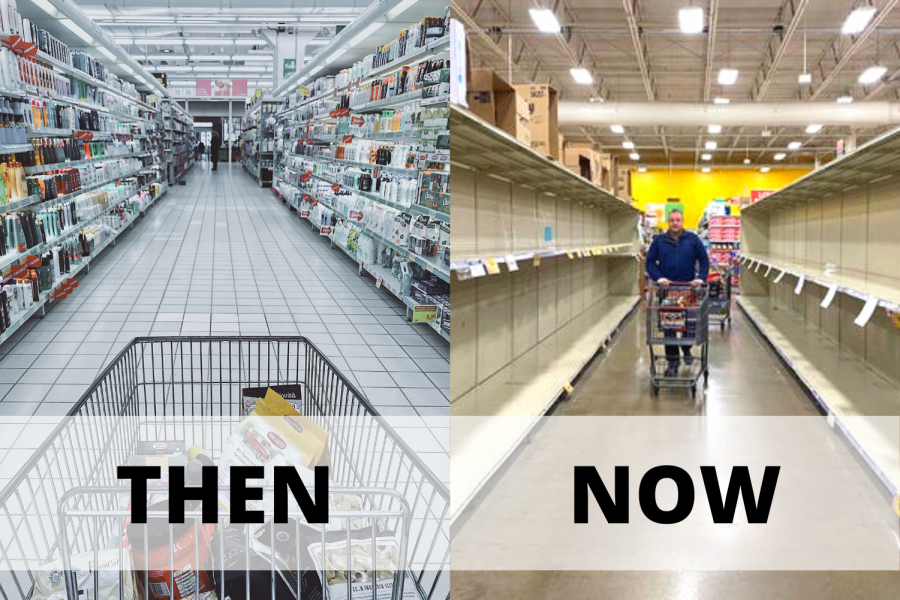You walk into a local store after it took you nearly an hour to find parking. Your eyes scan the shelves, looking for hand sanitizer, wipes, supplies to keep you and your family safe from coronavirus. But instead of the neatly ordered products you’re used to seeing, you’re greeted with blank, empty spaces.
You step farther into the store, roaming up and down aisles, but it’s no use. The cashier shakes her head when you ask when they’ll restock, and you’re forced to leave empty-handed. You drive from store to store, but it’s the same every time.
This is a reality many Americans are facing as the fear of COVID-19 grips the nation. Hysteria rises as schools close, events are canceled, and whispers of quarantining the country in homes run amok. This has led to what I call the “storming of stores,” or the rush to buy up all the cleaning products, canned goods, and apocalyptic survival kits.
Okay, maybe the last one isn’t true, but hearing about how people are buying everything they can get their hands on is almost laughable. I mean, toilet paper? Really? Are you going to tell me that you’ll quarantine yourself in the bathroom?
Although this might seem funny at first, there’s a darker side to this mass buying. Consider alcohol wipes, alcohol prep pads, and isopropyl alcohol, which have recently been snatched off store shelves. When Lysol wipes are out, panicking people switch to stockpiling these as they search for antibacterial wipes. But do you know who else needs these wipes more than you? People with diabetes who rely on these wipes to clean their skin before injections. Their lives could be in danger because people choose to stockpile rather than ration or share.
Who else is drastically affected by panic buying? People who are immunocompromised. When healthy people stock up on products that immunocompromised people have had to use their entire lives to avoid an increased chance of sickness, this puts them at an even higher risk of getting the coronavirus.
Those that are disabled have also been suffering at this time. Some that rely on food delivery services for groceries suddenly find that they’re unable to get their order, as the service is backed up by people who are healthy but unwilling to either cook or venture outside.
To make matters worse, some have used COVID-19 to profit off of desperate buying. According to the New York Times, on March 1, directly after the first coronavirus death in the United States was announced, brothers Matt and Noah Colvin visited several stores to clean the shelves of hand sanitizer and antibacterial wipes. Later, Matt Colvin posted his purchases on Amazon, selling 300 bottles of hand sanitizer for prices between $8 and $70 each, multiples higher than what he had bought them for.
Similarly, Chris Anderson, an Amazon seller in central Pennsylvania, bought about 10,000 masks from stores and made a $25,000 profit by reselling. Eric, who neglected to give his last name to the New York Times, estimates that he made $35,000 to $40,000 off of masks as well.
“Even at $125 a box, they were selling almost instantly,” Eric said. “It was mind-blowing as far as what you could charge.”
This upscaling of prices for personal profit has been a significant problem for a long time now, but amidst a pandemic, the issue is exacerbated. According to CNBC, Amazon removed hundreds of thousands of listings related to the coronavirus and has suspended thousands of sellers’ accounts for price gouging.
Although Amazon, eBay, Walmart, and other online companies have attempted to crack down on third-party sellers, it’s already too late. Many sellers had already cleared out their local stores and sold goods online by the time these companies began discouraging people from hoarding products and increasing prices. As a result, these third-party sellers were able to make excessive profits off of COVID-19.
In times of crisis, we must come together to help one another survive. Hoarding of supplies you won’t use in a couple of weeks that others go without is a selfish act, and selling said supplies for exorbitant prices preys on desperate people, especially those whose lives are in danger because of this pandemic.
And to the hoarders who are complaining that people keep getting infected: maybe if people had the supplies they needed to stay sanitized, the virus wouldn’t spread. Instead, they’re just sitting in your stockpile, waiting to be used by someone who needs them.
So what can you do to be a responsible citizen and help?
Leave the essentials like hand sanitizer and alcohol wipes for those who genuinely need them. Spread the word, and if you have supplies to spare, consider donating them to people in need. Don’t cough on people, and stay away from large crowds. Stay at home if you feel at all sick. And finally, you’ve probably gotten tired of hearing this but always wash your hands.
It’s long overdue for us healthy people to start considering how our mass buying affects others who aren’t as fortunate as us and acting on it. Now more than ever, we must come together to help those in need, and do whatever we can to mitigate the spread of COVID-19.
Stop storming the stores and stockpiling supplies. It’s not the end of the world for you, but it may end up meaning the world for someone else.












